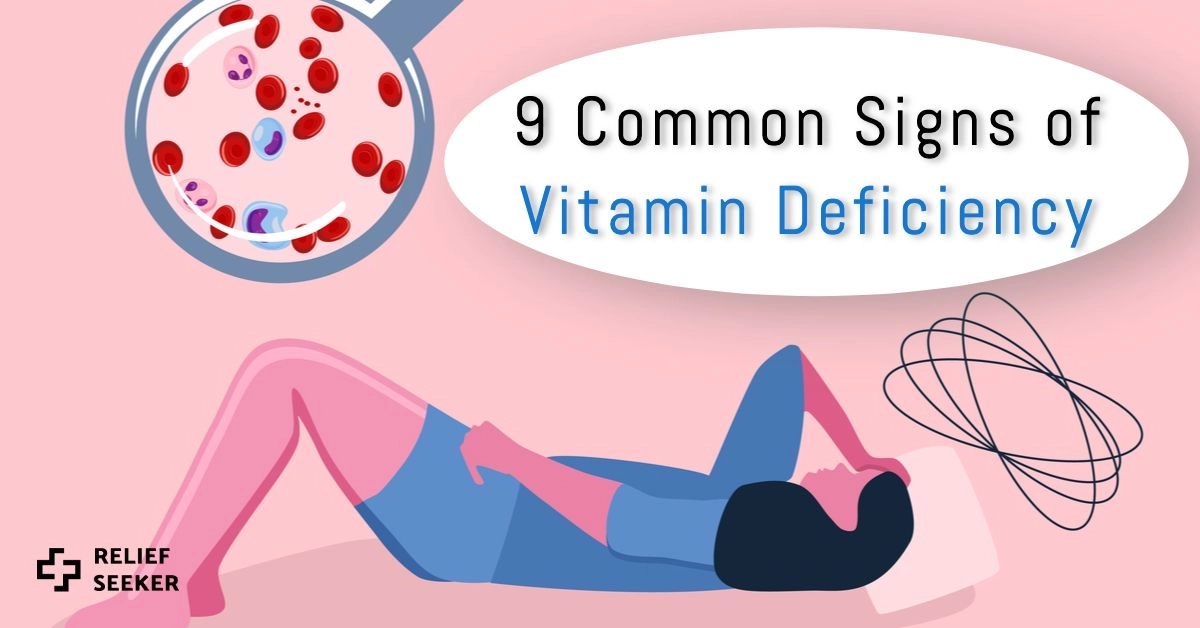It’s no secret that a well-balanced diet is essential for living a healthy life and that getting the proper amount of vitamins and minerals has many benefits. What is a secret is there are many people (probably more than you may realize) lacking in nutrients that may be causing a whole slew of unpleasant symptoms.
Symptoms like fatigue, hair loss, and brittle nails are just a few examples of the way your body is signaling that you might be vitamin and mineral deficient. Once you recognize your body’s cry for help, you can take the steps necessary to adjust your diet and treat what you lack accordingly.
Are you afraid that you might be vitamin deficient? The good news is that we’re here for you. Read on to discover 9 of the most common signs of vitamin and mineral deficiencies and what to do to get back up to par with your health.
Common Signs You Could be Vitamin Deficient
The 9 most common signs of nutrient deficiency are (these are in no particular order):
Brittle nails and hair
Restless leg syndrome
Acne
Mouth ulcers
Poor night vision or growths on eyes
Hair loss
Bumps on skin
Bleeding gums
Scaly patches and dandruff
Brittle Nails and Hair
Brittle hair, brittle nails, no thank you! For some, the way your hair and nails look makes all the difference. A variety of things can cause your hair and nails to become brittle, such as the shampoo or body wash you’re using, but the major player here is a lack of biotin (vitamin B7).
Biotin helps your body break down food, turning it into valuable energy, allowing the proper nutrients to be distributed throughout the body. When a person is biotin deficient, brittle, thinning, or splitting nails and hair are the most common and noticeable signs.
Other symptoms include fatigue, muscle pain or cramps, and unusual tingling in the feet and hands.
People most prone to developing a biotin deficiency are:
Pregnant women
Heavy smokers or drinkers
People with Crohn’s disease
People that have prolonged use of antibiotics and some anti-seizure medications
There are a variety of ways to add biotin to your diet. The easiest way is to incorporate biotin-rich foods, including:
Eggs yolks
Fish, like salmon and snapper
Dairy products
Nuts and seeds, like almonds, pumpkin seeds, and pistachios
Brasika, such as broccoli and cauliflower
Whole grains, like farro
Bananas
And if the above seems like it could be too difficult, people with brittle nails and hair can consider trying a daily biotin supplement. However, it’s important to let you know that only a few studies show the benefits of supplementing biotin over a biotin-rich diet to decrease the risks of developing a deficiency.
Along with the obvious benefits of stronger nails and hair, other benefits of proper biotin intake include:
Restless Leg Syndrome
Have you ever felt the constant need to move your legs, and no, we’re not talking about the urge to dance. Well, if you have felt this way, you might be suffering from restless leg syndrome (RLS), which is also known as Willis-Ekbom disease, is a nerve condition that causes unpleasant sensations in the legs accompanied by an overwhelming urge to move them.
RLS affects about 10% of the American population, most commonly women. Unfortunately, the causes of RLS aren’t quite understood, but researchers have found a connection between RLS symptoms and a person’s iron levels in the blood. For example, pregnant women are generally more prone to iron deficiencies, and several studies have shown that they also suffer from RLS during this time. Also, supplementing with iron generally helps decrease RLS symptoms, especially in people with a diagnosed iron deficiency.
To increase the intake of iron, you can try eating the following iron-rich foods:
Animal products, such as beef, lamb, and pork
Chicken
Fish
Legumes, like pinto beans and black beans
Dark leafy greens, such as kale and spinach
Nuts and seeds
Whole grains, like wheat durum
Taking daily iron supplements can be another way to prevent RLS. Still, it’s worth noting that too much iron can be extremely harmful, sometimes fatal, so it’s best to talk to your doctor before taking supplements.
Acne
There are many reasons why a pimple would surface, but one possibly unknown reason is a lack of zinc in the body. Zinc is the second most abundant mineral in your body. It is present in every cell and is necessary for the activity of more than 300 enzymes that help your metabolism, digestion, nerves, and immune system function properly.
“Acne is an infected skin inflammation that is most commonly related to an imbalance.” in hormones, but according to Sara Kahn, a board-certified nutritionist, it can also be a sign that a person is zinc deficient, which supports the immune system with its anti-inflammatory and antibacterial properties.
Other signs of a zinc deficiency can include:
Since zinc deficiency is connected to acne, you may want to think about implementing the following zinc-rich foods:
Animal products, such as red meat, chicken, and pork
Seafood, especially crab and lobster
Fish, such as white fish
Beans
Nuts
Dairy products, like yogurt and cheese
Like iron, too much zinc can be damaging and lead to zinc toxicity, so it is wise to consult your doctor before taking any zinc supplements.
Mouth Ulcers
Mouth ulcers, or most commonly known as canker sores, can often result from iron or B vitamins deficiencies. For instance, a study done by the National Institue of Health (NIH) found that patients with canker sores were twice as likely to have low iron levels. In another study, about 25% of patients also had vitamin B deficiencies, specifically thiamine (B1), riboflavin (B2), and pyridoxine (B6).
Mouth sores can be treated in a variety of ways, but if you’re looking for a more holistic way, you may want to start by making slight changes in your diet to include iron-rich foods or foods containing B vitamins, specifically riboflavin.
Foods rich in iron include:
Animal products, including fish, poultry, and beef
Beans
Dark, leafy greens
Nuts, seeds, and whole grains
You can find thiamine, riboflavin, and pyridoxine in the following foods:
Whole grains
Poultry
Fish
Eggs
Dairy
Organ meats, such as liver
Starchy veggies
Nuts and seeds
If you begin to incorporate the above foods and your symptoms worsen or don’t seem to be improving, talk to your doctor or check out our list of online doctors as there could be an underlying condition that requires more than a shift in your diet.
Poor Night Vision or Growths on the Eyes
It is said that any diet that lacks proper nutrition can sometimes cause vision problems. Vitamin A deficiency has been linked to night blindness, which reduces the ability to see in low light or darkness because vitamin A is essential for rhodopsin production (a pigment found in the eyes). If this condition is left untreated, night blindness can ultimately become xerophthalmia, damaging the cornea and leading to blindness.
Xerophthalmia also causes little, white, elevated growths to form on the white parts of the eyes and can be removed to an extent, but can only be permanently treated when a person’s vitamin A deficiency is gone.
To ensure you’re getting enough vitamin A in your diet, try eating more vitamin A-rich foods such as:
Organ meats, like liver
Dairy
Fish
Yellow and orange-colored veggies, like carrots, butternut squash, and sweet potatoes
Taking a vitamin A supplement is also an option, but like iron and zinc supplements, it can be hazardous if consumed in excess.
Hair Loss
As one of the most common conditions in adults, hair loss has been linked to being deficient in iron, zinc, vitamin B3, and vitamin B7.
Iron is present in the DNA of hair follicles, and too little iron can cause your hair to stop growing or fall out.
Zinc is involved in two processes needed for hair growth, and lacking zinc may cause hair to fall out.
Vitamin B3 (Niacin) helps keep hair healthy, shining, and growing.
Vitamin B7 (Biotin) also aids in hair growth, and when someone is deficient has been connected to hair loss.
Many people with vitamin and nutrient-rich diets believe that it helps prevent them from being deficient in the above nutrients and prevents hair loss.
Foods you can start incorporating include:
Iron and zinc-rich
Animal products, like meat and fish
Dark, leafy greens, whole grains
Nuts and seeds
Niacin-rich
All the above, plus egg yolks and organ meat
If you’ve already talked to your doctor and aren’t deficient in any of the aforementioned nutrients and are still experiencing hair loss, there are other providers, like Hims and Roman, that specialize in hair loss specifically for men. These providers are great because they are 100% online, so you can talk to a licensed medical doctor and order any supplements discretely from the comfort of your own home.
White or Red Bumps on the Skin
These bumps are commonly known as keratosis pilaris and are a condition that causes goosebump-like bumps to begin appearing on a person’s cheeks, thighs, arms, or buttocks. This condition usually appears in children and has been linked to people with diets deficient in vitamin A and C.
Since keratosis pilaris is said to disappear in adulthood naturally, there hasn’t been much research conducted, so these bumps aren’t quite fully understood.
People with keratosis pilaris can treat these bumps by adding more vitamin A and C to their diets. Food high in both vitamins include:
Fruits, such as citrus, berries, and tomatoes
Organ meats
Dairy
Eggs
Fish
Yellow and orange-colored veggies
Bleeding Gums
We’re all guilty of flossing a bit too hard from time to time, but did you also know that a vitamin C deficiency can cause bleeding gums? Vitamin C is not only essential for proper wound healing and general immunity; it’s also an antioxidant that helps prevent cell damage. And did you also know that your body doesn’t make vitamin C on its own, so the only way to remain on the right side of a vitamin C-rich diet is to eat an adequate amount each day.
When a person is deficient in vitamin C for a prolonged period of time, it can not only make your gums bleed but can also cause gum decay and make your teeth fall out. Yikes! Another serious but less common sign you are vitamin C deficient is if you develop scurvy. You might be giggling because only Captain Jack Sparrow can get scurvy, but this serious condition depresses your immune system, weakens muscle tissue, and generally makes you feel tired all the time.
Other signs of vitamin C deficiency include:
Slow wound healing
Dry, scaly skin
Easy bruising
Nosebleeds
To ensure you’re getting enough vitamin C in your daily diet, you will want to each as many vitamin C-rich fruits and vegetables as possible. Think of the acronym for the colors of the rainbow we learned in Kindergarten, ROY-G-BIV when you’re planning out daily meals.
R(ed) - radishes, strawberries, tomatoes
O(range) - oranges, pumpkin
Y(ellow) - spaghetti squash, lemons, bananas
G(reen) - spinach, kale, limes, apples
B(lue) - blueberries
I(digo) - we can go ahead and lump this one into the blue category
V(iolet) - purple grapes, eggplant, purple carrots
Scaly Patches and Dandruff
When we think of dandruff, we usually think of the weirdo kid that never washed his hair that we sat behind in high school Chemistry. Well, news flash, dandruff is more common than you think; about 50% of American adults suffer from dandruff at some point in their lives.
Seborrheic dermatitis (SB), more commonly known as dry, scaly patches, is a condition that affects the oil-producing areas of your body. Both SB and dandruff are categorized by itchy, flaking skin, with dandruff mostly appearing on the scalp and SB appearing on the scalp and the face, chest, armpits, and groin areas.
SB and dandruff may be caused by various things, with a vitamin-deficient diet leading the pack. If you feel like you’re dandruff or SB is caused by a lack of nutrients, it may be a wise decision to pack your daily food intake with foods that are rich in zinc, vitamin B3 (niacin), riboflavin (vitamin B2), and pyridoxine (vitamin B6).
These foods include:
Whole grains
Animal products, including beef, poultry, fish, and organ meats
Eggs and dairy
Legumes
Green veggies
Starchy veggies
Nuts and seeds
If you’ve been to the doctor and a nutrient deficiency isn’t the cause of your skin issues, you may have an underlying condition that needs to be treated by a medical professional. Many online doctors treat a variety of skin issues from the comfort of your home. Providers like Musely and Rory are specifically designed to treat all kinds of skin issues, including dandruff and seborrheic dermatitis.
Vitamin Deficiency Treatment Options
Treating your vitamin deficiency can be as easy as changing your diet, and to best understand what you lack in your diet, you will first need to have a chat with your doctor. Your doctor will be able to run a blood test that can pinpoint certain deficiencies. The only downside here is that it has the potential to be very costly, and your insurance may not cover certain blood panels.
Another way to get a more comprehensive look at nutrient deficiencies is to check out Vessel Health or EverlyWell. Vessel Health specializes in at-home wellness tests that measure the levels of 10 essential vitamins and minerals with just a few drops of your urine in a matter of minutes. Gone are the days of painful needle pricks and waiting weeks for the results.
Regardless of how you choose to find out what you might be deficient in, making the decision to better your health is what matters!


